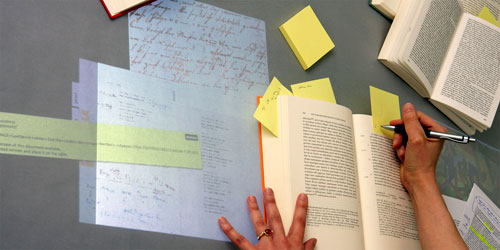Next-generation Hybrid Desktop Environment for Literary Scholars

Co-locating physical and digital media in one surface to combine their advantages.
Literary Scholars?
Literary scholars are researchers that study the creation, transmission, reception, and meaning of works of literature. Accordingly, for a given text, there may be a large and multi-faceted amount of information to consider in the analysis. Such information can include drafts, variants, related works by the same or other authors, and secondary literature. Traditionally, this data has been made available in printed editions targeted at the scientific audience. These editions often suffer from the static nature of paper, as editors have to find a way to select and structure this data. More recently, digital editions for use on a computer have become available. Both modalities offer unique advantages in terms of interaction quality, flexibility, and potential for personalization. However, we found out that typical workflows that include both kinds of documents do not combine these strengths well.Hybrid Documents: Co-located, Tangible Interaction
Our approach uses a desk-sized interactive tabletop that co-locates physical and digital documents. This enables the user to include digital documents into the highly effective spatial structuring strategies that are typical of working with printed documents. Furthermore, through the detection of books on the tabletop surface, we can augment physical media with flexible digital information at page level, which we call Hybrid Documents. This effects tangible navigation of digital data, and brings the central text and its wealth of supplementary information closer together.Publications
- Stephan Deininghaus, Max Möllers, Moritz Wittenhagen, Karin Herrmann and Jan Borchers. Hybrid Documents Ease Text Corpus Analysis For Literary Scholars. In Proceedings of ITS 2010,2010.


- Karin Herrmann, Max Möllers, Moritz Wittenhagen and Stephan Deininghaus. Ein interaktiver Multitouch-Tisch als multimediale Arbeitsumgebung. In Digitale Wissenschaft 2010, Hochschulbibliothekszentrum NRW, Cologne, 2010.


